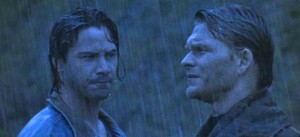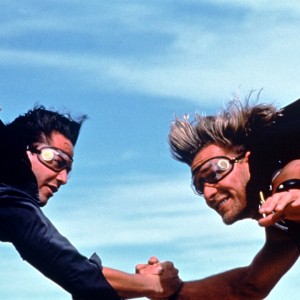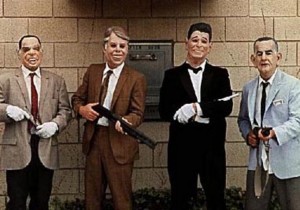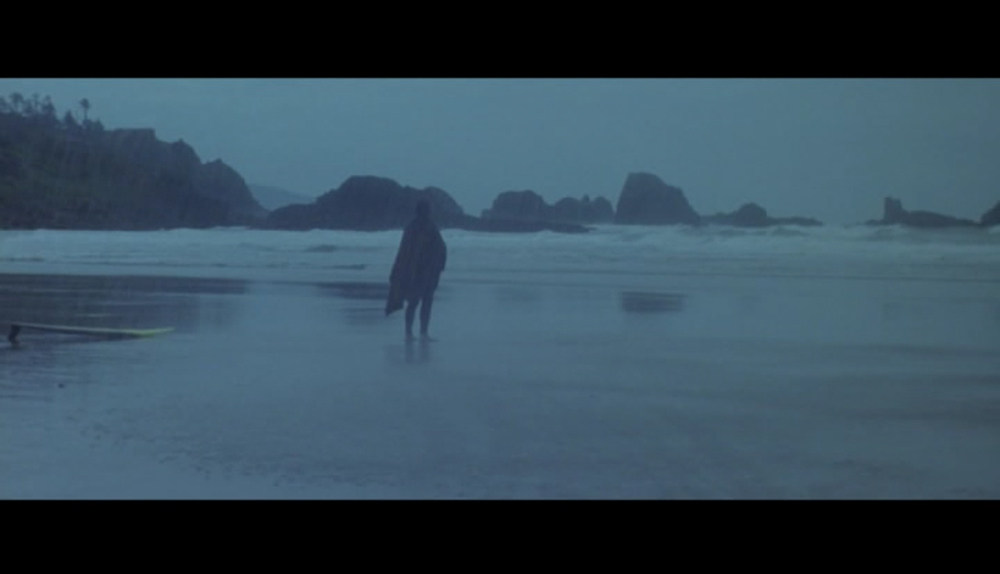There’s something both frightening and comforting in cinema’s ability to remind viewers of the humanity in those charged to protect and serve us. It’s frightening, because it means that they’re corruptible and prone to errors, but it’s also comforting to know that they understand the concept and power of seduction. Most of all, they’re people who possess the capacity for forgiveness. These are aspirational stories that provide relief from the disgusting reality of monolithic police forces. At their best, they show viewers the way they wish justice would function; at their worst, they reflect the sheltered perspectives of privileged viewers and reify the righteousness of law enforcement. It’s why we’re relieved when Paul Walker’s Brian O’Conner lets Vin Diesel’s Dom Toretto off the hook at the end of The Fast & The Furious; yeah, Dom might be an outlaw, but he’s a good guy. He’s not out to hurt anybody, and it’s comforting to think that pathos can sway officers of the law to obeying the spirit rather than the letter. That’s the story of The Fast & The Furious, and it’s the general premise behind its spiritual predecessor, Point Break. The latter is a far darker story, however: when Brian lets Dom off the hook, the latter becomes a sort of globetrotting Robin Hood, a guy bad enough to be intriguing but moral and loving enough you feel comfortable rooting for him. Patrick Swayze’s Bodhi is a more monstrous breed of outlaw.
Point Break, helmed by Zero Dark Thirty director Kathryn Bigelow, came out in 1991, and stars Patrick Swayze, Keanu Reeves, Gary Busey, and Lori Petty. Reeves, fresh off of the first Bill & Ted, plays Johnny Utah (no, really), an ex-quarterback and newly-minted FBI agent tasked with solving bank robberies in an alternate universe 1991 Los Angeles noticeably lacking people of color. He teams up with veteran shit-disturber Angelo Pappas (Busey), and they’re soon hot on the trail of a gang known as the Ex-Presidents, who rob banks in rubber masks bearing the caricatured visages of former Presidents.
The Ex-Presidents, Pappas theorizes, are actually surfers: they only run jobs in the summer, they’re careful to not take too long, and nobody gets hurt. Some FBI hair toxin analysis technobabble backs up this theory (which is a pretty bitter pill to swallow considering recent events). To get to the bottom of what’s going on, Utah and Pappas devise a foolproof plan: Utah must infiltrate LA surf culture, identify the bank-robbing crew, and bust them.
Of course, this being a Hollywood cop movie, the mission ends up hopelessly compromised after Utah forges completely genuine friendships with the crew. Tyler (Lori Petty), acerbic and confrontational, saves him after he nearly dies during a disastrous novice attempt at surfing. This prompts him to use a canny combination of FBI resources, con-man strategies, and PUA bullshit to insinuate himself into her life and convince her to teach him how to surf. Tyler gives Johnny his in into the LA surfer culture, where he meets two different surfer crews, very unlike in temperament. The first is a bunch of meth-dealing reprobates led by a dude named Warchild, who boasts modern adult contemporary star Anthony Kiedis on his crew. The second is a chill group of surfer bros following the faux-zen advice of a white dude with the very unlikely name of Bodhi (Swayze), who’s described by Tyler as “a modern savage, a real searcher,” and, of course, turns out to be the criminal mastermind behind the Ex-Presidents.
The Fast franchise’s Dom Toretto, even in his undeveloped state in the first movie, is ultimately a family guy who just doesn’t mind ripping off the rich and corrupt if it allows him to drink Coronas in his backyard. He lives for the thrill tempered by a legitimate love of and loyalty to the people close to him. Bodhi, on the other hand, lives entirely for the rush, and his relationships with his friends are simply vessels he can manipulate to finance and justify the ultimate ride. He lives in a cycle of constant escalation, robbing bigger banks and riding bigger waves to build the nest egg he needs to go to Australia for what he believes, due to a fifty-year storm cycle, will be the biggest wave he can possibly find. He intends to use this ride to bring his cycle to its apocalyptic end, and thus realize his death wish.
Bodhi doesn’t initially reveal this part of his character, though. Affable, non-confrontational, and popular, it’s easy to see why Utah falls into the gravity well of his charisma. Utah falls just as quickly into love with the woman he deceived, and finds himself staying up all night at parties. His undercover lifestyle begins to encroach on the integrity of his undercover mission, and, by the time he finally realizes that Bodhi is the criminal mastermind he’s been searching for, he lets his inner conflict get the better of him at a decisive moment, in which he allows a cornered and desperate Bodhi to completely unhinge and accelerate his spiral of self-destruction. By the end of the movie, almost everyone has died, Bodhi gets his ultimate wish, and Utah dramatically throws his badge into the ocean.
If you’ve never seen Point Break, chances are you’ll recognize its initial plot from both the first The Fast & The Furious and the Phil Lord/Chris Miller 21 Jump Street, with one major twist. In those movies, the masterminds are largely harmless: Little Franco in Jump is a callous dipshit, but not a willing murderer, and Dom spends four more movies after the first Fast & Furious becoming a renegade folk hero, defender of the innocent, and an all-around automotive Robin Hood/James Bond mash-up. The viewer never questions whether Brian did the right thing by letting him go. Bodhi, on the other hand, is an amoral monster, played with dick-swinging zen charisma that slowly morphs into unhinged sociopathy, and Utah’s choice to spare him leads to a disastrous, nihilistic finale, with Bodhi getting exactly what he wants while Utah emerges a victor only in the most Pyrrhic sense.

“If you want the ultimate, you’ve got to be willing to pay the ultimate price.”
Reeves plays the corn-fed, Midwestern Utah as never quite comfortable in his own skin while displaying the persona of a straightlaced FBI agent, but he’s definitely in his element hanging with the surf crowd; like a Ted Logan who got his shit together but ended up getting a job where he had to pretend to be Ted Logan. Lori Petty’s a sarcastic thrillseeker who Utah basically takes complete advantage of, physically and emotionally, yet she stays with her duplicitous beau to and after the end. Gary Busey’s Gary Busey.
W. Peter Iliff’s (Varsity Blues, Patriot Games, and owner of a face that seems like it should be in this movie) screenplay, based on a story written by him and the less successful Rick King, is a quip-filled, machismo-sweating action script that Bigelow’s fetishistic direction cleverly subverts. The film’s hangout scenes feel somewhat like far more self-aware versions of Tony Scott’s volleyball-and-synthesizer montages in Top Gun, with wetsuit-wearing or bare-chested surfers cavorting and ball-busting on the beach like hipster prototypes.
The surfing sequences, however, are something else altogether. Doubtlessly informed by Bigelow’s painterly background, the viewer enjoys long shots of gorgeous, cresting waves that sublimate the actors into the background and let the ocean itself take a lead role. Except, like, with Ratt songs. These idyllic, poetic moments are juxtaposed with frenetic, almost cartoonish action sequences, such as a meth-house raid in which Anthony Kiedis jumps around screaming with a hole in his foot while a naked woman stabs an FBI agent to death; a tense bank robbery where the stakes and risk-taking pile higher and higher, leading to a mortifying crescendo of self-destructive machismo; and a brilliantly madcap suburban chase sequence concluding with Bodhi setting a car on fire with a gas pump and a lighter. The movie’s action bona fides are considerable, and Bigelow handles both tones of the film with aplomb, inventive in raising the stakes and making creative use of the settings.
Point Break is both heavily a product of its time, that weird cusp between the 1980s and 1990s, and heavily timeless, the archetypal story of the lawman seduced by outlaws, caught between his badge and his heart. It’s oft-mimicked, but this is its purest iteration, a story that starts off playfully and concludes in a surprisingly cruel manner. It causes significant viewer whiplash as it veers between gorgeous visual rumination on man’s insignificance and dudes drinking beers while listening to hair metal, all of which only adds to its considerable charm. It’s executed with a remarkable degree of technical skill, and, while it’s certainly more of a morality play than the somewhat lighter stories it’s inspired, it’s also got Patrick Swayze in a Ronald Reagan mask throwing a dog at Keanu Reeves, so it avoids taking itself too seriously. Point Break presents the viewer with a fantasy tale of innate humanity seducing a man primarily interested in logic, and leading him to ultimately seek what law enforcement officials are currently incapable of offering us: justice.




